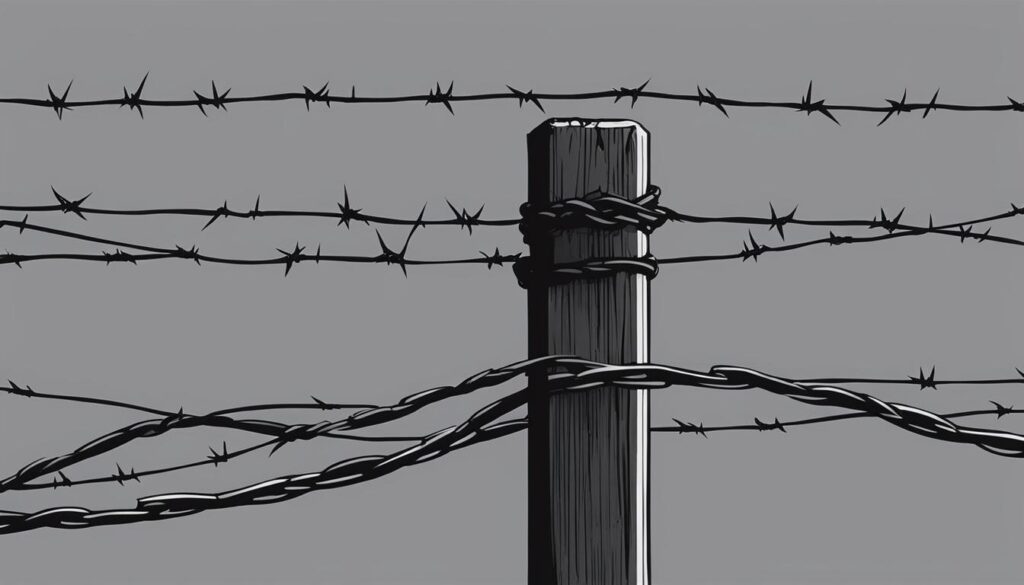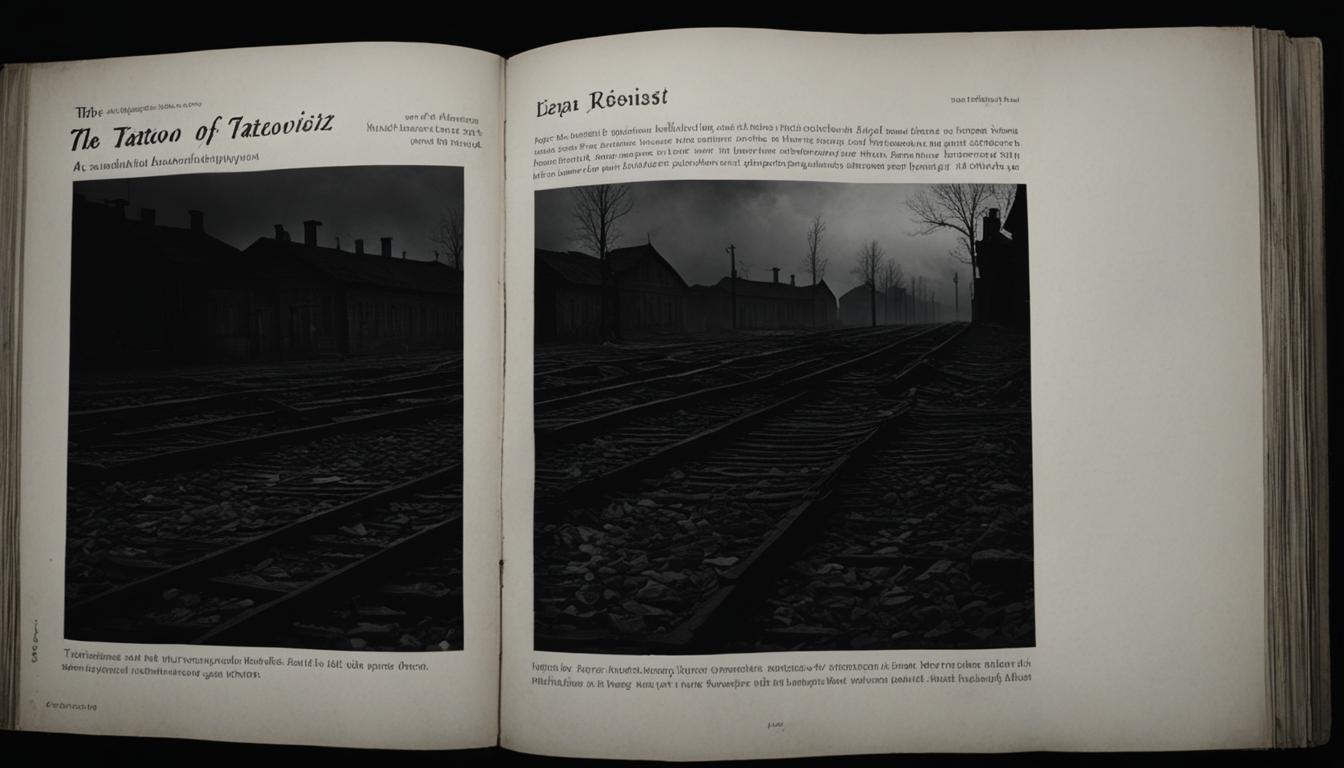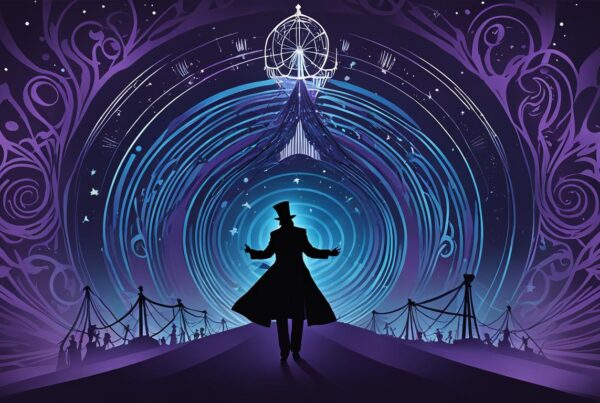Welcome to our comprehensive audiobook review of “The Tattooist of Auschwitz” by Heather Morris. This powerful story is a must-read for anyone seeking a deeper understanding of the resilience of the human spirit in times of unimaginable adversity.
Within this review, we will explore Morris’s intricate storytelling, the audiobook narration, the themes explored, as well as the impact this book has made on readers and the literary community. If you are considering diving into this emotional journey, read on to discover everything you need to know before doing so.
Key Takeaways
- “The Tattooist of Auschwitz” is a powerful and emotional story that delves into the resilience of the human spirit during difficult times.
- Heather Morris’s storytelling is intricate and skillful, weaving together a tale that is difficult to put down.
- The audiobook narration brings the story to life, immersing listeners in the intense and emotional journey.
- The themes explored throughout the book, such as love and resilience, are profound and thought-provoking.
- “The Tattooist of Auschwitz” has made a significant impact on readers and the literary community, earning widespread critical acclaim.
Overview of “The Tattooist of Auschwitz”
Heather Morris’s “The Tattooist of Auschwitz” is a compelling work of historical fiction that explores the harrowing experiences of prisoner 32407, Lale Sokolov, as he navigates life in the concentration camp. Through Sokolov’s eyes, Morris eloquently depicts the horrors of the Holocaust, shedding light on the inhumanity and brutality of the Nazi regime.
The plot revolves around Sokolov’s love story with fellow prisoner Gita, a relationship that offers hope and solace amidst the atrocities of the camp. The book is a poignant reminder of the resilience of the human spirit and the power of love, even in the midst of darkness.
The themes tackled in “The Tattooist of Auschwitz” are thought-provoking and emotionally charged. Morris delves into the concepts of survival, love, and humanity, painting a vivid picture of the conditions endured by prisoners in the concentration camp. The novel is a gripping and unflinching portrayal of a difficult time in history.
Plot Summary
The novel follows Lale Sokolov, a Slovakian Jew who is transported to Auschwitz-Birkenau in 1942. As he navigates the horrors of the concentration camp, Sokolov is given the job of tattooing identification numbers on the arms of incoming prisoners. This job, though it comes with some privileges, also puts him at risk as he is forced to interact with the SS officers.
Despite the brutality and inhumanity around him, Sokolov falls in love with Gita, another prisoner in the camp. Their relationship offers them both a glimmer of hope and reminds them of their humanity even in the darkest of times.
Throughout the book, Morris weaves a poignant tale of survival, love, and the strength of the human spirit in the face of unimaginable adversity. The novel is a powerful reminder of the atrocities committed during the Holocaust and the importance of remembering and honoring those who suffered.
The Author, Heather Morris
Heather Morris was born in New Zealand and currently resides in Australia. Prior to becoming an author, she worked in a variety of fields, including as a social worker and a flight attendant. Morris’s inspiration for “The Tattooist of Auschwitz” came from her time working with Holocaust survivor Lale Sokolov, who shared his story with Morris over the course of three years.
With only a high school education, Morris began writing Lale’s story, which she initially envisioned as a screenplay. However, after encouragement from friends, Morris turned it into a novel. Since its release in 2018, “The Tattooist of Auschwitz” has become an international bestseller, translated into multiple languages.
Known for her evocative storytelling and meticulous research, Morris brings a keen eye for detail to her work. In addition to “The Tattooist of Auschwitz,” Morris has also written its sequel, “Cilka’s Journey,” based on another survivor’s experience at Auschwitz.
Heather Morris’ background and unique access to Holocaust survivor stories has allowed her to craft a deeply moving and insightful novel that has impacted readers worldwide.
Audiobook Narration
The audiobook version of “The Tattooist of Auschwitz” offers a powerful and emotional performance, bringing the story to life through skillful narration.
The narrator, Richard Armitage, delivers a stunning performance, using his voice to convey the complex emotions and experiences of the characters.
His ability to capture the accents and intonations of various characters adds depth and authenticity to the story, allowing listeners to fully immerse themselves in the world of Auschwitz.
The audiobook performance enhances the experience of this already compelling story, making it a must-listen for fans of historical fiction.
Themes Explored
In “The Tattooist of Auschwitz,” Heather Morris explores themes that resonate with readers long after they turn the final page. Through the story of Lale and Gita’s love and survival amid unimaginable horrors, Morris delves into the deep and devastating truths of the human experience.
Resilience in the Face of Adversity
The theme of resilience stands out as Lale and Gita face the brutality of the concentration camp, fighting for survival and for each other. Despite the unimaginable terrors they endure, they persist in their love, hope, and determination to survive.
The Power of Love
Love is at the heart of “The Tattooist of Auschwitz,” giving Lale and Gita the strength to endure. Their love story unfolds in a place of unimaginable darkness, bringing hope and light to a devastating situation.
The Human Spirit
The resilience, love, and determination demonstrated by Lale and Gita illustrate the unbreakable human spirit. Morris shows that even in the darkest of times, the human spirit can persist and survive.
Message of the Book
Amidst the horrors of the Holocaust, “The Tattooist of Auschwitz” reveals the power of hope, humanity, and love. This novel is a reminder of the importance of compassion and resilience in the face of adversity, the strength of love, and the unbreakable nature of the human spirit.
Character Analysis
In “The Tattooist of Auschwitz,” Heather Morris crafts a cast of complex and multidimensional characters, each with their own unique story to tell. At the center of the novel is the protagonist, Lale, a brave and compassionate man who endures unimaginable horrors during his time at Auschwitz. Through Lale’s eyes, readers witness the daily struggles of life in the concentration camp and the incredible acts of courage and kindness that emerge amidst the despair.
Throughout the novel, Morris also introduces a compelling supporting cast, each of whom plays a vital role in the story. From Gita, Lale’s love interest, to Cilka, a fellow prisoner who becomes a close friend, the characters in “The Tattooist of Auschwitz” are each brilliantly drawn and imbued with their own unique motivations and complexities.
Perhaps most impressive, however, is Morris’s deft hand at character development. As the story progresses, readers witness each character undergo significant growth and change, shaped by both their experiences at Auschwitz and their relationships with one another. By the novel’s conclusion, readers are left with a profound understanding of these individuals and the deep emotional impact of their stories.
The Protagonist: Lale
Lale is undoubtedly the heart of “The Tattooist of Auschwitz.” As the titular tattooist, he is responsible for inking the identification numbers on each new arrival at the camp. Through his eyes, readers witness the horrific conditions of the concentration camp and the incredible resilience and humanity that emerges amidst the wretchedness.
Throughout the novel, Lale undergoes significant personal growth. Initially focused solely on surviving, he eventually becomes determined to help his fellow prisoners in any way he can. His love story with Gita also serves as a powerful motivator, compelling him to fight for their survival and find a way to maintain their connection even amidst the atrocities of the camp.
The Supporting Cast
Perhaps just as compelling as Lale himself is the supporting cast Morris has crafted. From Cilka, a fellow prisoner who is singled out and targeted due to her beauty, to Dr. Miriam, a courageous doctor who risks her own life to help others, each supporting character in “The Tattooist of Auschwitz” has a unique story to tell.
However, none are quite so impactful as Gita, Lale’s love interest. As one of the few people in the camp who brings him moments of joy amidst the darkness, Gita is a symbol of hope and humanity. Her strength and resilience in the face of unimaginable adversity are a testament to the power of love and connection, and serve as a driving force behind much of Lale’s own growth and development.
Overall, Morris has crafted a cast of characters that is both realistic and deeply compelling. From Lale’s own journey of self-discovery to the struggles and triumphs of each supporting character, “The Tattooist of Auschwitz” is a testament to the strength and resilience of the human spirit.
Writing Style and Pacing
In “The Tattooist of Auschwitz,” Heather Morris showcases a unique writing technique that allows readers to connect with the story on a personal level. The narrative style is raw and emotional, leveraging vivid descriptions to bring the characters and setting to life. Her emphasis on detail creates an immersive atmosphere that draws readers in and keeps them engaged throughout the book.
The pacing of the book is well-crafted, allowing readers to absorb the weight of the events and emotions portrayed in the story. Morris strikes a delicate balance between action and reflection, giving readers time to process the events while still keeping the story moving forward. The result is a narrative that remains impactful and gripping from beginning to end.
One of the most remarkable aspects of Morris’s writing style is her ability to convey complex emotions and experiences in a clear and concise manner. She avoids excessive exposition and instead relies on precise language to convey the nuance and depth of the characters’ emotions. This style allows for a deeper connection between the reader and the characters and amplifies the impact of key moments in the narrative.
Throughout “The Tattooist of Auschwitz,” the pacing of the book and the unique writing style combine to create a truly unforgettable reading experience. Morris’s literary choices elevate the themes and messages of the book, leaving a lasting impression on readers long after the final page.
Historical Accuracy and Research
Heather Morris’s “The Tattooist of Auschwitz” is a historical fiction novel that recounts the touching love story of Lale Sokolov and Gita Furman in Auschwitz. The book captures a tragic moment in history, and Morris strived to preserve the accuracy of the events while weaving a fictional narrative.
Morris’s research process involved interviewing Lale Sokolov and reading various accounts of the Holocaust to create an authentic story. She felt a deep responsibility to ensure the accuracy of the events portrayed in the book and consulted with experts on the Holocaust to double-check her work.
While Morris’s dedication to historical accuracy is commendable, some critics have questioned the authenticity of her portrayal of the concentration camp. Despite such criticisms, many readers have praised the book for its poignant portrayal of the Holocaust, which highlights the strength of the human spirit in the face of unimaginable horror.
Fact vs. Fiction
Morris’s blend of fact and fiction has been a topic of debate among readers and critics. While the book is based on a true story, certain events and details were fictionalized to fit the narrative structure. For example, Morris took some liberties with the timeline of events to create a more compelling storyline. However, she maintained the authenticity of the main characters and the accuracy of the broader historical context.
Table: Accuracy of Key Events
| Event | Accuracy |
|---|---|
| Lale Sokolov’s role as Tattooist | Accurate |
| Gita Furman’s story | Accurate |
| Timing of events | Fictionalized for narrative purposes |
| Depiction of concentration camp | Criticized for lack of authenticity |
Despite the fictionalization of certain events, Morris’s novel remains a gripping and emotional read that resonates with readers. “The Tattooist of Auschwitz” is a powerful reminder of the atrocities that occurred during the Holocaust and the strength of the human spirit to survive and love even in the darkest of times.
Reception and Impact
Since its release in 2018, “The Tattooist of Auschwitz” has received widespread critical acclaim and garnered a loyal following among readers. Book reviews have praised Heather Morris’s poignant storytelling and the way in which she brings to life the experiences of the characters.
Audience reactions to the novel have been overwhelmingly positive, with many readers moved to tears by the emotional depth and rawness of the story. “The Tattooist of Auschwitz” has resonated with people around the world, inspiring them to learn more about the Holocaust and the atrocities committed during WWII.
The cultural significance of this work cannot be overstated. “The Tattooist of Auschwitz” has sparked important conversations about the nature of human resilience, love, and morality, and has highlighted the importance of bearing witness to historical events.
The book has since been translated into numerous languages and has been included in various educational curricula and reading lists worldwide. Its impact continues to be felt and celebrated, making it a must-read for anyone interested in understanding the human experience of the Holocaust.
Comparison to Other Holocaust Literature
Heather Morris’s gripping novel, “The Tattooist of Auschwitz,” offers a unique perspective on the harrowing events that occurred during the Holocaust. However, it is just one of many powerful works of Holocaust literature that have been written over the years. By comparing “The Tattooist of Auschwitz” to other notable works, we can gain a deeper understanding of its strengths and weaknesses, as well as its place within the literary canon.
List of Related Books:
| Book Title | Author | Publication Year |
|---|---|---|
| Night | Elie Wiesel | 1960 |
| Maus | Art Spiegelman | 1986 |
| The Book Thief | Markus Zusak | 2005 |
| Survival in Auschwitz | Primo Levi | 1947 |
| The Diary of Anne Frank | Anne Frank | 1947 |
These books, along with many others, offer unique perspectives on the Holocaust and its lasting impact on the world. By comparing them to “The Tattooist of Auschwitz,” we can gain a deeper appreciation for the themes and messages conveyed by Morris, as well as placing it in context within the wider literary landscape.
Ultimately, “The Tattooist of Auschwitz” stands on its own as a powerful work of fiction and a testament to the resilience of the human spirit, but it is important to view it as part of a wider discourse on the Holocaust and its legacy.
Discussion and Controversies
“The Tattooist of Auschwitz” is a powerful book that raises many controversial and ethical questions. The novel is based on the true story of Lale Sokolov, a Slovakian Jew who was imprisoned in Auschwitz and forced to tattoo numbers onto his fellow prisoners. While the book has received widespread acclaim for its portrayal of survival, resilience, and love in the face of unimaginable horrors, there have also been debates about its accuracy and representation of the Holocaust.
Some critics have questioned the way in which Morris depicts the relationships between the prisoners and the guards, arguing that it is unrealistic and detracts from the reality of the brutality of the concentration camp. Others have raised concerns about the use of a romantic subplot, given the context of the historical events. The book has also faced criticism for its portrayal of the role of the Slovakian government in the deportation of Jews.
Despite these controversies, “The Tattooist of Auschwitz” has sparked important discussions about the representation of the Holocaust in literature and media. It raises questions about the ethics of creating fictional works based on real events, and the responsibility of authors to accurately depict the experiences of those who lived through the atrocities of the Holocaust.

Book Club Discussion
“The Tattooist of Auschwitz” is a thought-provoking and emotionally charged book that would make an excellent choice for a book club discussion. The controversies and ethical considerations surrounding the book make for a rich and engaging conversation, allowing readers to dive deeper into the themes and issues explored by Morris. Some potential questions for discussion include:
- What impact does the romantic storyline have on the portrayal of the Holocaust in the novel?
- How does “The Tattooist of Auschwitz” compare to other works of Holocaust literature, in terms of style and themes explored?
- Is it ethical to create fictional works based on real-life events, such as the Holocaust?
- What responsibility do authors have to accurately represent historical events in their work?
By engaging in these discussions, book club members can grapple with complex ethical and historical issues, as well as deepen their understanding and appreciation of “The Tattooist of Auschwitz” as a work of literature.
Conclusion
In conclusion, The Tattooist of Auschwitz audiobook offers a powerful and emotional journey through one of the darkest moments in history. Heather Morris weaves a gripping narrative that explores themes of love, resilience, and the human spirit, while also providing a thought-provoking perspective on the Holocaust.
The skillful narration brings the characters to life, immersing the listener in the story and creating an impactful experience. The writing style and pacing are expertly crafted, with Morris’s literary choices contributing to the overall impact of the narrative.
Despite the controversies and ethical considerations raised by the story, we wholeheartedly recommend The Tattooist of Auschwitz to anyone interested in historical fiction or Holocaust literature. It is a must-read for book clubs and individuals alike, and has had a significant impact on readers and the literary community.
Overall, this audiobook is an emotional and thought-provoking journey that will leave a lasting impact on listeners. We highly recommend it.



